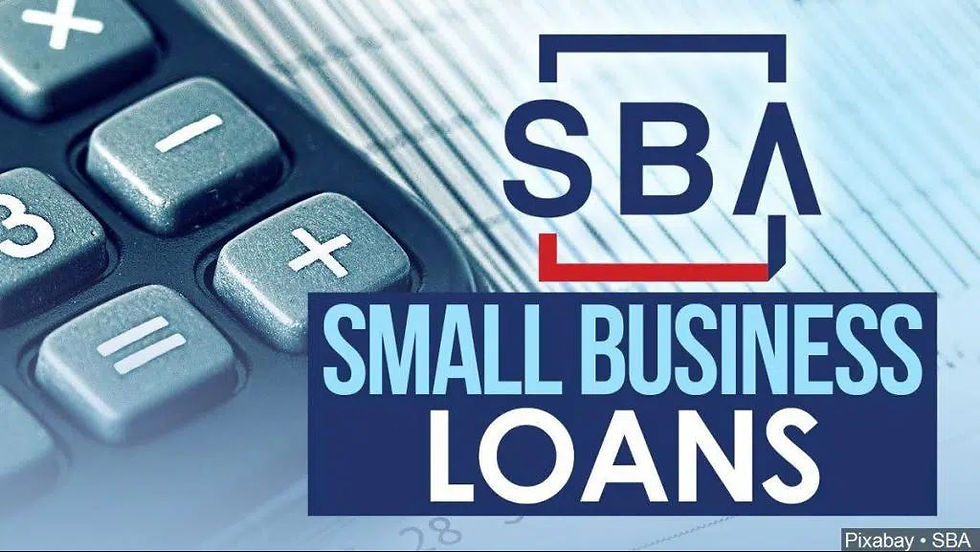SBA Loan Programs
- globalfinanceteams

- Oct 18, 2022
- 3 min read

As a business owner, you may be looking for ways to fund your next project or expansion. One option to consider is a loan from the Small Business Administration (SBA). SBA loans can be a great way to get the financing you need to grow your business. In this post, we'll take a look at some of the different types of SBA loans available and how they can benefit your business. Keep reading to learn more!
SBA Microloan Program
A Microloan is a unique program that provides small business owners with the resources to grow and expand their operations. The typical borrower profile for this type of lending is someone who may have had credit problems in past, but it's likely they are now more able-bodied than before; making them perfect candidates!
Lender: Non-profit lenders approved by SBA
Maximum Loan Amount: $50,000
Interest Rate: Fixed average 8%
Maximum Loan Term: 6 years
Fees: Up to 2% of the loan amount
Collateral: varies from lender to lender, a personal guarantee is likely
Typically used for: working capital, supplies, equipment, furniture & fixtures
SBA 7(a) Guaranty Loan Program
The typical 7(a) borrower profile is an existing business, although startups are eligible. For each owner of the company, 20% or more must be satisfactory personal credit (no recent bankruptcies). The lender's minimum requirement for a good score will depend on what they're looking for in their borrowers- but it shouldn't have been too hard to get approved if you follow these guidelines!
Lender: Banks and Credit Unions
Maximum Loan Amount: $5 Million
Interest Rate: Generally Prime +2.75%
Maximum Loan Term: 10 years (25 years for real estate)
Fees: 2% - 3.75% of guaranteed amount
Collateral: Personal Guaranty of 75% - 85% of loan amount
Typically used for: working capital, inventory, equipment, real estate, debt refinance, acquisition, and franchise.
SBA 504 CDC Loan Program (Certified Development Companies)
The typical 504 borrower profile is a seasoned business that can demonstrate repayment ability from historical cash flow. Owners have sufficient personal assets to cover a minimum 10% down payment. These borrowers may be seeking to avoid uncertainty of lease renewals and rent increases, and benefit from commercial real estate ownership. The 504 is usually introduced after a mortgage lender is on board to finance the project property.
Lender: Non-profit CDC approved by SBA
Maximum Loan Amount: $1,123,588
Interest Rate: Fixed, about 5+%
Maximum Loan Term: 25 years, fully amortizing
Fees: 3% of loan amount
Collateral: 2nd lien on Project property
SBA Eligibility
Must be a for-profit business
Must qualify as a small business concern
Must be an eligible type of business
Must be at least 51% owned by US citizens or legal permanent residents.
Owners cannot be on probation or parole
SBA Ineligible businesses
Businesses primarily engaged in lending
Life insurance company
Real estate investors and landlords
Pyramid sale distribution plans
More than 1/3 of gross revenue from gambling
Private clubs that limit membership
Speculative businesses
How to Apply for a Loan
The typical loan application will require the following:
Prior year’s tax returns
Historical financial statements
3-year Pro-forma financial statement forecast
Working capital schedules like Accounts Receivables, Accounts Payable, and Inventory.
CAPEX schedules
Business Plan
Personal Assets (for personal guarantees)
Looking for financing options to help your business grow? Check out the SBA loan programs offered through local banks. At Global Finance Teams we can help you get the money you need to succeed. Before applying for any type of financing, it is important for businesses to have their books in good order. GFT's accounting services can help get your books ready for a loan application. Continued monthly accounting will help borrowers maintain a healthy relationship with their lenders. GFT corporate finance services can help guide your business with the loan application process.



Comments